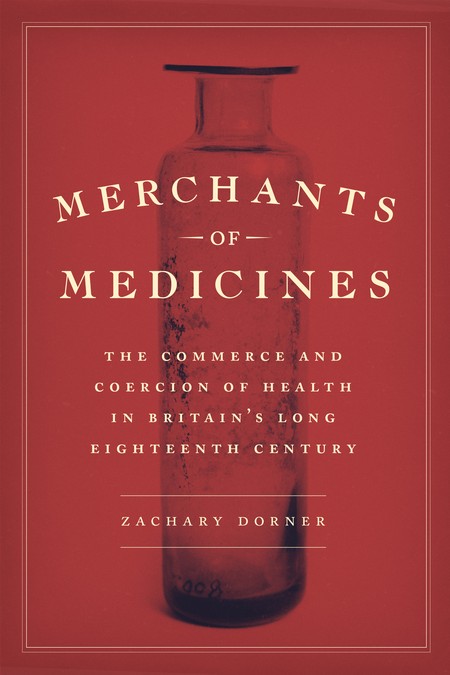Zachary Dorner, author of “Merchants of Medicine,” on the Coronavirus and Black Americans
The death of black Americans due to coronavirus at a disproportionately high rate recalls the ways differential mortality reflects and has shaped ideas of inherent bodily difference in the past. Zachary Dorner discusses this connection using ideas and examples from his book Merchants of Medicines: The Commerce and Coercion of Health in Britain’s Long Eighteenth Century (available in May).
Data recently collected by The Washington Post (link) point to stark disparities in morbidity and mortality during the current pandemic between black and white Americans. While upsetting, such a finding does not come as a particular surprise to a historian of medicine and empire. (Nor, for that matter, does it to scholars of race or to people whose lived experience is one of unequal health). Such health outcomes are often the result, intended and not, of longstanding policies and practices used to construct the economic and political realities we live with today. Notably, U.S. Surgeon General Jerome Adams has attributed his own cardiovascular issues, and therefore susceptibility to the virus, to the “legacy of growing up poor and black in America.” Structural disparities not only contribute to disparate health outcomes as starkly demonstrated this year by the SARS-CoV-2 virus, but historically have also contributed to medical stereotypes based on observations of how people seemed to respond to ailments differently given the expectation of a one-size-fits-all approach for much commercialized medicine.
“How differential health outcomes are mapped onto persistent categories of difference and inequality speaks to the importance of historians and historical analysis in trying to understand this pandemic and moving forward in its aftermath.”
The eighteenth century was a time of transoceanic empires, mass migrations, and dramatic social and cultural change that set the stage for today’s connected and unequal world, as well as established the role medicine would play in it. In such a globalizing world of overseas warfare, natural resource extraction, and long-distance trade dependent on groups of laborers (of varying freedom status), bulk medicine that treated the ailment rather than the individual seemed both promising and necessary. It offered the possibility of more streamlined, cost and time effective, and ultimately more efficacious treatment given the constraints facing many medical practitioners and the prevailing challenges of manpower. While such a take-this-for-that approach may seem familiar to many who go to the pharmacy to purchase over-the-counter remedies for coughs, fevers, warts, and other complaints, in the early modern period such an idea was new and quite radical if you consider that it suggested an emperor, merchant, sailor, and enslaved person could all ingest and theoretically be cured by the same medicine. Yet, under such an expectation of universally-applicable medicines for certain diseases, differing outcomes could easily be turned to justify emergent racial ideologies across the slave societies of the Atlantic world.
Under the coercive conditions of plantation slavery, disparities in health outcomes were common given the institutionalized deprivation and violence of enslaved labor. Those disparities, however, were often attributed to racial pathologies rather than the structural patterns of enslaved labor. These perceptions informed entire genres of medical literature that pervaded eighteenth- and nineteenth-century medical practice. There are certainly many more examples of this kind, but let me focus on one particular example from Merchants of Medicines One influential medical text, Dr. Collins’s Practical Rules for the Management and Medical Treatment of Negro Slaves in the Sugar Colonies (1803), articulated an idea of physiological difference marked by skin color based on disease susceptibility and treatment effectiveness in Caribbean plantations. Dysentery, according to Collins, affected black people more severely than white people “so that the two varieties of men seem to pass out of life by two different outlets; the one by fluxes, and the other by fevers.” Though he differentiated between the severity of ailments suffered by those of Afro-Caribbean and European descent based on his experience as an estate owner and medical practitioner, Collins lamented that “the knife of the anatomist, however, has never been able to detect [different internal organization].” In other words, though he based his belief in the inherent bodily difference of people with varying skin color on observations of how they responded to disease and treatment, Collins could find no physiological basis for it from his reading of anatomy texts or perhaps his own grisly forays into dissection. This omission, however, did not stop Collins’s text and others like it from propagating such racial ideologies. What this example illustrates, then, is that at the very moment that medical practitioners gained access to bulk, manufactured medicines and began prescribing them with greater authority, racialized ideas about bodily difference and disease also gained legitimacy within the institutions underwriting those medical developments.
During the SARS-CoV-2 pandemic we run the risk of inspiring similar ideas as co-morbidities drive differential mortality that reflects structural and historical factors rather than genetics, behavior, or anything inherent. The conflation of biological difference with structural difference can make perceived pathologies between groups seem more “natural” or ahistorical than they are. Such hasty conclusions can also mask inconsistencies in reporting demographic and mortality data shaped too by those same structural differences. How differential health outcomes are mapped onto persistent categories of difference and inequality speaks to the importance of historians and historical analysis in trying to understand this pandemic and moving forward in its aftermath.
Zachary Dorner is the Patrick Henry Postdoctoral Fellow in the History Department at Johns Hopkins University.
Merchants of Medicines: The Commerce and Coercion of Health in Britain’s Long Eighteenth Century will publish this May. It is available for preorder on our website or from the bookseller of your choice.
